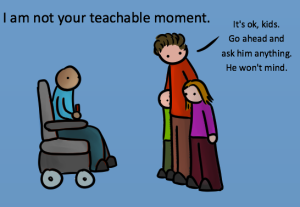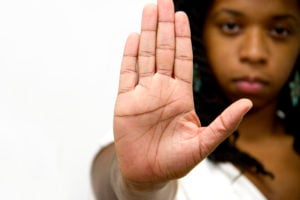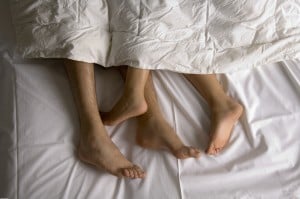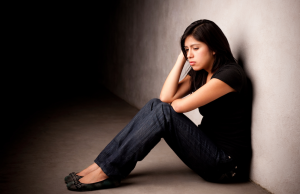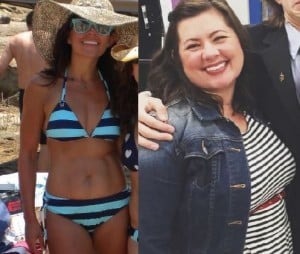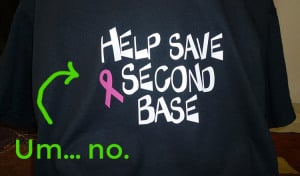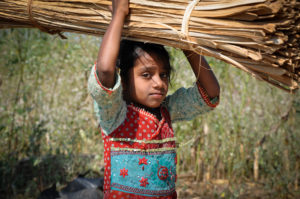
A child outdoors carrying a bundle of vegetation on top of their head.
If you live in the United States, it’s easy to see certain matters as feminist issues.
A bunch of creepy, old white dudes policing reproductive health is clearly a feminist issue. Republicans banning trans women from using the women’s restroom, apparently because they have some weird fantasy about cis men dressing up as ladies after seeing too many unfunny ‘90s comedies, is obviously a feminist issue. Donald Trump bragging about sexually assaulting women (that is, “grabbing the pussy”)? Also a feminist issue – because gross, Donald, back off.
However, there is oftentimes a glaring omission in even the best intersectional progressive’s spectrum of feminist concerns: climate change.
Now, this environmental justice article is going to focus on women simply because it’s an entry point that many feminists will be familiar with, even though environmentalism obviously affects (and feminism is about) all different kinds of people.
At a foundational level, many people understand feminism as a movement for women. Unfortunately, that often means that only the needs and wants of privileged cis white ladies get addressed. But the movement needs to be more than that.
Feminism is a movement that takes various intersections of oppression into account in the pursuit of achieving liberation from those systems for all people. And when we look at the environment through a social justice lens, we can recognize that it affects marginalized groups more intensely – for example, women. (Fear not: Class, race, and environment are other important intersections that will be addressed in forthcoming articles!)
And in this article, when we say “women,” we truly mean all people who identify as women. However, we also recognize how statistics are often erasive of trans and gender non-conforming experiences. Unfortunately, we can’t know how other sources define “women” or “men” when they use the terms, and these sources often ignore non-binary, agender, and gender non-conforming identities altogether.
Climate change should concern you if you claim to be a feminist because women – a marginalized group that many people come to feminism through – are on the frontlines of extreme weather.
They’re the most vulnerable, the most likely to die, and they’re also doing a lot of the work to mitigate the worst consequences of severe weather.
So if you care about women (and I’m assuming that, if you’re a feminist, that you do), here are five reasons you should care about environmental justice.
1. The Climate Affects Everything Else
It’s great that you’re concerned about reproductive justice and income equality. You should be! Those are really important issues. However, none of that other stuff matters if Earth becomes charred wreckage. Women quite literally can’t have access to any of that other good stuff if our planet is uninhabitable.
Climate change epically screws women.
During Hurricane Matthew, hospitals in Florida opened special hotlines for pregnant individuals who would need to seek shelter during the storm. As Governor Rick Scott and visibly sweating Fox News host Shepard Smith screamed for able-bodied persons to flee the state, pregnant people were pretty much out of luck.
Even fortunate patients who were admitted last minute at the University of Miami/Jackson Memorial Medical Center were required to bring their own bedding and enough water and food for four days (thanks?).
In Haiti, the United Nations Population Fund (UNFPA) expressed deep concern about the fate of more than 8,400 pregnant individuals (trans men and non-binary folks can get pregnant, so this isn’t just a cis lady issue – something else you should be aware of as a good feminist!).
“Hurricane Matthew delivered a severe blow to Haiti’s health facilities, whether by flooding these centers or blowing off their roofs and putting them out of service,” said Dr. Babatunde Osotimehin, UNFPA Executive Director. “Our urgent task is to protect the health and rights of women and girls, and to ensure that their basic needs, which are often overlooked in humanitarian situations, are quickly met. We will work to help women give birth and live, despite this tragedy.”
Climate change is chaos and total destruction.
Hurricane Sandy, for example, destroyed or damaged an estimated 1.8 million structures and homes, with an economic loss exceeding $65 billion. Ten thousand people lost tourism jobs.
If we look back even further, to Hurricane Katrina, New Orlean’s population was only 72% of its pre-storm level eight years after the storm.
It takes a really, really long time for communities to recover from severe storms – and in the meantime, there’s a void in which people live minute-to-minute. And that makes fighting for broad social change much more difficult (not impossible, but very hard).
Climate change threatens to put the good stuff – repro rights, income equality – on the backburner indefinitely.
2. Climate Change Is a Race and Poverty Issue
Race and poverty are feminist issues, too!
Privileged white ladies will not win the fight for gender equality on their own – and how boring and sad (not to mention problematic) would a world in which feminism only included white ladies be anyway? (I say this as a white lady.)
Poor people of color are a majority of the world’s population, and women of color have played huge roles in every social movement pretty much since the beginning of time.
Simply put: Feminism cannot advance its agenda without poor women of color at the center of it, so any event that affects them should concern feminists everywhere.
Plus, you should care about this stuff anyway if you’re a decent person simply because it’s the right thing to do!
While it’s unquestionably tragic that twenty individuals have died in the United States in the wake of Hurricane Matthew, that death toll pales in comparison to the level of devastation in Haiti where hundreds of people have died.
And while it’s become customary for certain countries, like France, to experience an outpouring of love and support following something like a tragic terrorist attack, Haiti hasn’t received the same kind of international solidarity.
Part of the reason may be because there is no “bad guy,” unlike in a terrorist attack. A storm isn’t a terrorist, and a hurricane doesn’t make a conscious decision to kill people, so it’s tempting to view what’s happening in Haiti as bad luck. Sorry, Haiti. No one is going to change the color of their avatar for you. You’re just a bunch of unfortunate suckers trapped in the pathway of a storm.
But the truth, as always, is much more complicated.
The United States occupied Haiti until 1934, so Haiti never had an opportunity to build up institutions – and it was this occupation that set a precedent of poverty. Then came the horrible earthquake in 2010 that killed thousands of people, followed by a cholera epidemic.
Haiti has never been able to fully get back on its feet, nor build up its infrastructure, and all of the foreign aid and donations have been dispensed in highly dubious ways that rarely actually reach the people who need relief the most.
The victims in Haiti are virtually all poor people of color. In addition to the hundreds killed, anywhere from 15,000 to 27,000 people have been displaced with hundreds injured and at least 20,000 homes destroyed.
These individuals, many of them women, have no means to rebuild their homes – and there is no doubt that the factors of race and poverty are the reasons the devastation in Haiti isn’t the leading story on every news show and the first question in every presidential debate.
Poor people are invisible because they don’t have access to media or social networks. That’s why it’s so important for those of us who do have those tools to talk about the horrific effects of climate change.
3. Women Are Affected the Most in Climate Change Disasters
A 2007 study from the London School of Economics found that natural disasters are more likely to kill women than men, and that the disparity is largest where women are the poorest. Further, 80% of all climate refugees are women.
In most cases, this is because they stay to protect their children or lack the means to leave. They can’t access private transportation, don’t have a car, or can’t afford gas. Quite literally, they’re trapped on the frontlines of climate change.
The United Nations states that women commonly face “higher risks and greater burdens” from the impacts of climate change, namely because most of the world’s poor people are women, and poor people are more likely to be victims of climate change and also lack the methods to escape the effects of their hostile environment.
Additionally, the women left behind are doing some of the hardest work, which is only going to get more taxing as the earth heats up.
A 2010 UN report revealed that in 63% of households in rural sub-Saharan Africa, women must collect and carry the family’s water. In only 11% of households does this job fall to men. Carrying jugs of water across a desert in very hot weather ordinarily isn’t pleasant, let alone when temperatures dangerously skyrocket. This commonplace household task has transformed into a life-threatening endeavor that will primarily endanger women.
Hotter temperatures mean fewer cold days that are needed to kill off mosquitoes, hence the explosion of the Zika Virus. And this new hot environment means the mosquitos are very cozy as they travel further and further distances – which is why we’re seeing more documented cases of the virus in the United States.
Discrimination in legal systems also makes it more difficult for women to recover from the effects of climate change.
According to the World Bank, 155 out of 173 economies have at least one legal difference between men and women that may significantly reduce the economic opportunities of women.
This makes it more difficult for women to access land or finance businesses, which in turn make it difficult for them to recover after the land is savaged by water or local infrastructure collapses.
And this is only if women are lucky enough to live in a country where they can provide input in decision-making conversations! According to an Environment and Gender Index study, for six out of nine environmental decision-making processes, women represent less than one-third of decision makers.
4. Things Are Only Going to Get Worse
Scientists have relentlessly warned us about rising sea levels and worsening storms, and we’re beginning to now see their predictions come true.
In January, the Department of Housing and Urban Development for the first time allocated federal tax dollars to move an entire community struggling with the impacts of climate change. The residents of Isle De Jean Charles in Louisiana are literally sinking into the sea.
The New York Times interviewed three residents – all women – about the exodus.
“Yes, this is our grandpa’s land,” Joann Bourg said. “But it’s going under one way or another.”
In the next fifty years, scientists have predicted that Kiribati, a remote island republic in the Central Pacific, will vanish because of rising sea levels, and Native Alaskans have already begun to flee their homeland due to the warming effects of climate change.
And as the water rises, it’s also warming, which scientists say will lead to even stronger storms. Climate scientist Michael Mann told the Huffington Post: “The nearly unprecedented rapid intensification we saw with [Hurricane Michael] is favored by warmer oceans and greater ocean heat content.”
Floods, droughts (loss of crops and eventual starvation), heat waves, and storms are all going to get worse and women, the most vulnerable individuals, will stay behind to deal with the consequences.
Politicians that are quick to pay lip service to “protecting women” when the agenda suits them (the invasion of Iraq, fighting ISIS, and so on) are slow to show the same concern when a global threat like climate change threatens to kill millions of women.
If politicians were serious about protecting women, they would make climate change their number one cause.
5. Women Are Really, Really Good at Organizing
The final reason you should consider environmental justice a feminist issue is because you can help a lot!
First of all, if you’re a woman, you’re more likely to know what the hell is going on: Women are more likely to believe in climate change, and a 2014 European Union study found that women are consistently more concerned about climate change than men, and more willing to make sacrifices to reduce emissions.
In short, women rule – and many are working tirelessly to mitigate the effects of climate change.
Immediately following the devastation of Hurricane Matthew, UN Women mobilized to get relief to Haitians, coordinating with the Haitian government and with national women’s groups to assess damage and to ensure women and girls will benefit equally from any assistance.
As the organization itself put it: “During times of natural disasters and conflicts women and children often bear the brunt of the crisis, being the last escape as they prioritize the safety of their family and children… Women’s needs and voices often remain unheard in humanitarian emergencies, but that inevitably delays the recovery process.”
But it’s not as if women are sitting around waiting to die. In fact, it’s women who are organizing the most to help other women deal with the consequences of our changing environment.
There’s Winnie Byanyima, a Ugandan aeronautical engineer turned politician who serves as the Executive Director of Oxfam International and is a world authority on the gender dimension of climate change.
At the Warsaw climate talks in 2013, she led a mass walk-out in objection of large polluters participating in the event. In particular, Byanyima took issue with the idea of “clean coal,” an oxymoron that is, in fact, a lie. There is no such thing as clean coal.
Christiana Figueres is another powerful woman in the fight against climate change. She heads the United Nations Framework Convention on Climate Change (UNFCCC) and plays a role in almost all major global talks in respect to climate.
Figueres is perhaps best known for what has been described as her relentless optimism. Her mantra: “Impossible is not a fact – it is an attitude.”
Then there are the countless women participating in direct action protests all over the world, outside the climate change talks, far removed from the halls of power. In particular, Native women have been fighting the Dakota Access Pipeline construction that threatens to poison their environment.
“Indigenous people have been on the frontlines of environmental justice since the European invasion,” Basmin Nadra told the Riverfront Times. For centuries, women have been an invaluable resource in the fight against climate change.
The good news is that there are many ways to help. Chances are, if you’re reading this, you’re in a fortunate enough position to offer support – even if that support comes in the form of raising awareness about climate change.
***
The planet is all we have – and women, as is true in all of life, will pay the highest costs during the changes in our climate.
As progressives, we should always be trying to make it better for all people, but good feminists should especially care about the plights of poor women of color.
Whether we’re physically chipping in with the effort by protesting environment-destroying projects like the Dakota Access Pipeline, or raising awareness online or in our own communities about how the greatest threat humanity currently faces is climate change, there’s something for all of us to do.
Women are working every day to ready their homes for our changing planet, and if we’re really serious about the concept of solidarity, we should be doing everything in our power to help.
[do_widget id=’text-101′]
Allison Kilkenny is the co-host of the progressive political podcast Citizen Radio (wearecitizenradio.com) and author of #NEWSFAIL. Her work has appeared on/in Rolling Stone, The Guardian, MTV, Countdown with Keith Olbermann, MSNBC, The Nation, L.A. Times, and NPR.
Search our 3000+ articles!
Read our articles about:
Our online racial justice training
Used by hundreds of universities, non-profits, and businesses.
Click to learn more
Most Read Articles
- « Previous
- 1
- …
- 30
- 31
- 32





